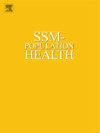Welfare policy and suicide: The role of “supporting the self-reliance of persons in need” program in Japan
IF 3.1
2区 医学
Q1 PUBLIC, ENVIRONMENTAL & OCCUPATIONAL HEALTH
引用次数: 0
Abstract
Background
Japan experienced a substantial decrease in suicide rates in the 2010s. During this period, the “Supporting the Self-Reliance of Persons in Need” program was initiated to target individuals struggling to meet basic needs. The program provides personalized consultations and subprograms that address the residence issues, necessities, employment needs, and household finance management problems. This study evaluates whether this program is related to the decline in Japan's suicide rates in the 2010s.
Methods
The first analysis employs a difference-in-differences approach, using the monthly suicide rates in 815 cities across Japan from 2009 to 2015. Policy exposure refers to the period after pilot programs were introduced in cities between 2013 and 2015. The second analysis examines whether the number of subprograms application counts is associated with the suicide rates by fiscal year.
Results
The introduction of self-reliance support in cities is related to a monthly reduction of 0.066 and 0.041 in suicide rates among men and women, respectively. The associations are found among the population under 60 years, particularly strong for males and the middle-aged. The second analysis suggests that the employment training program shows the strongest association with lower suicide rates. An additional employment training application per 100,000 population is associated with a 0.256 reduction for males and 0.169 for females in the annual suicide rates.
Conclusions
The introduction of self-reliance support is associated with reduced suicide rates, mainly among males and the middle-aged. The employment training subprogram demonstrates the strongest association with lower suicide rates.
福利政策与自杀:日本“支持有需要的人自力更生”计划的作用
日本在2010年代经历了自杀率的大幅下降。在此期间,启动了“支持有需要的人自力更生”计划,以满足基本需求的个人为目标。该方案提供个性化咨询和子方案,解决居住问题、必需品、就业需求和家庭财务管理问题。这项研究评估了这个项目是否与2010年代日本自杀率的下降有关。第一个分析采用了差异中的差异方法,使用了2009年至2015年日本815个城市的月度自杀率。政策曝光指的是2013年至2015年在城市引入试点项目后的一段时间。第二项分析考察了子项目申请数量是否与财政年度的自杀率有关。结果在城市引入自力更生支持与男性和女性自杀率每月分别下降0.066和0.041有关。这些关联在60岁以下的人群中发现,尤其是男性和中年人。第二项分析表明,就业培训计划与较低的自杀率之间的联系最为密切。每10万人中增加一份就业培训申请,每年的自杀率男性降低0.256,女性降低0.169。结论自力更生支持的引入与自杀率的降低有关,主要发生在男性和中年人之间。就业培训子项目显示出与较低自杀率的最强关联。
本文章由计算机程序翻译,如有差异,请以英文原文为准。
求助全文
约1分钟内获得全文
求助全文
来源期刊

Ssm-Population Health
PUBLIC, ENVIRONMENTAL & OCCUPATIONAL HEALTH-
CiteScore
6.50
自引率
2.10%
发文量
298
审稿时长
101 days
期刊介绍:
SSM - Population Health. The new online only, open access, peer reviewed journal in all areas relating Social Science research to population health. SSM - Population Health shares the same Editors-in Chief and general approach to manuscripts as its sister journal, Social Science & Medicine. The journal takes a broad approach to the field especially welcoming interdisciplinary papers from across the Social Sciences and allied areas. SSM - Population Health offers an alternative outlet for work which might not be considered, or is classed as ''out of scope'' elsewhere, and prioritizes fast peer review and publication to the benefit of authors and readers. The journal welcomes all types of paper from traditional primary research articles, replication studies, short communications, methodological studies, instrument validation, opinion pieces, literature reviews, etc. SSM - Population Health also offers the opportunity to publish special issues or sections to reflect current interest and research in topical or developing areas. The journal fully supports authors wanting to present their research in an innovative fashion though the use of multimedia formats.
 求助内容:
求助内容: 应助结果提醒方式:
应助结果提醒方式:


